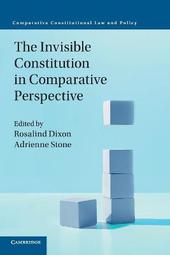
|
The Invisible Constitution in Comparative Perspective
Paperback / softback
Main Details
| Title |
The Invisible Constitution in Comparative Perspective
|
| Authors and Contributors |
Edited by Rosalind Dixon
|
|
Edited by Adrienne Stone
|
| Series | Comparative Constitutional Law and Policy |
|---|
| Physical Properties |
| Format:Paperback / softback | | Pages:593 | | Dimensions(mm): Height 230,Width 152 |
|
| ISBN/Barcode |
9781108405478
|
| Classifications | Dewey:342 |
|---|
| Audience | | Professional & Vocational | |
|---|
| Illustrations |
Worked examples or Exercises; 1 Tables, black and white; 1 Halftones, black and white
|
|
Publishing Details |
| Publisher |
Cambridge University Press
|
| Imprint |
Cambridge University Press
|
| Publication Date |
8 August 2019 |
| Publication Country |
United Kingdom
|
Description
Constitutions worldwide inevitably have 'invisible' features: they have silences and lacunae, unwritten or conventional underpinnings, and social and political dimensions not apparent to certain observers. The Invisible Constitution in Comparative Perspective helps us understand these dimensions to contemporary constitutions, and their role in the interpretation, legitimacy and stability of different constitutional systems. This volume provides a nuanced theoretical discussion of the idea of 'invisibility' in a constitutional context, and its relationship to more traditional understandings of written versus unwritten constitutionalism. Containing a rich array of case studies, including discussions of constitutional practice in Australia, Canada, China, Germany, Hong Kong, Israel, Italy, Indonesia, Ireland and Malaysia, this book will look at how this aspect of 'invisible constitutions' is manifested across different jurisdictions.
Author Biography
Rosalind Dixon is Professor of Law at University of New South Wales, Sydney, and visiting professor at Harvard Law School, Fall 2017. Her work focuses on comparative constitutional law and constitutional design, theories of constitutional dialogue and amendment, socio-economic rights, and constitutional law and gender. She is co-president elect of the International Society of Public Law, and on the Editorial Board of its associated journal, the International Journal of Constitutional Law. She is also advisor to the Public Law Review and the Journal of Institutional Studies. Her work has been published in leading journals in the US, Canada, the UK and Australia. She is co-editor, with Tom Ginsburg, of Comparative Constitutional Law (2011) and Comparative Constitutional Law in Asia (2014). She is also co-editor, with Mark Tushnet and Susan Rose-Ackermann, of the Edward Elgar series on Constitutional and Administrative Law and editor of the Constitutions of the World series. Adrienne Stone is Redmond Barry Distinguished Professor, Director of the Centre for Comparative Constitutional Studies and Kathleen Fitzpatrick Australian Laureate Fellow at Melbourne Law School. She is First Vice President of the International Association of Constitutional Law and is a Fellow of the Academy of Social Sciences in Australia. She writes on constitutional law and theory, with particular attention to freedom of expression. Her work has been published widely in international journals on these questions. She is co-editor, with Cheryl Saunders, of The Oxford Handbook on the Australian Constitution (forthcoming) as well as co-editor with Frederick Schauer of the forthcoming Oxford Handbook in Freedom of Speech.
Reviews'The invisible constitution, the small-c constitution, extraconstitutional rules, conventions and norms - these and similar ideas occupy a large space in contemporary thinking about constitutions. The essays in this collection wrestle with these protean concepts, using tools from legal theory, political science, and sociology. The concepts may remain elusive after one reads the essays, but the reader will undoubtedly have a better and more sophisticated grasp on their possible meaning.' Mark Tushnet, William Nelson Cromwell Professor of Law, Harvard Law School, Massachusetts 'Dixon and Stone have assembled a world-class group to investigate a subject of deep importance to all scholars of public law. Unseen but neither unknown nor uncontested, the invisible constitution raises serious challenges for constitutional design, constitutional interpretation and constitutional change. This volume addresses each of these and more, and does so with rich comparative perspectives that leave the reader asking foundational questions about the nature of higher law, the limits of codification, and the necessary and sufficient conditions for constitutionalism - the mark of an outstanding study in public law.' Richard Albert, University of Texas, Austin
|